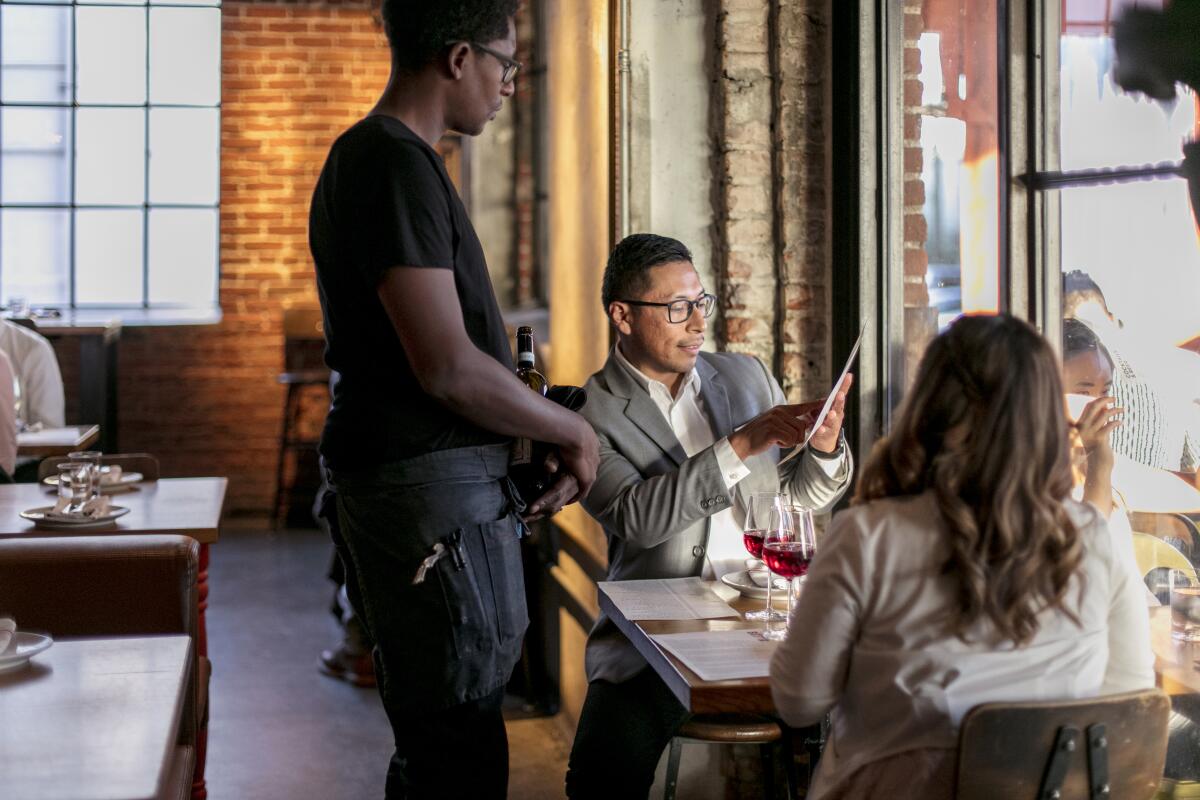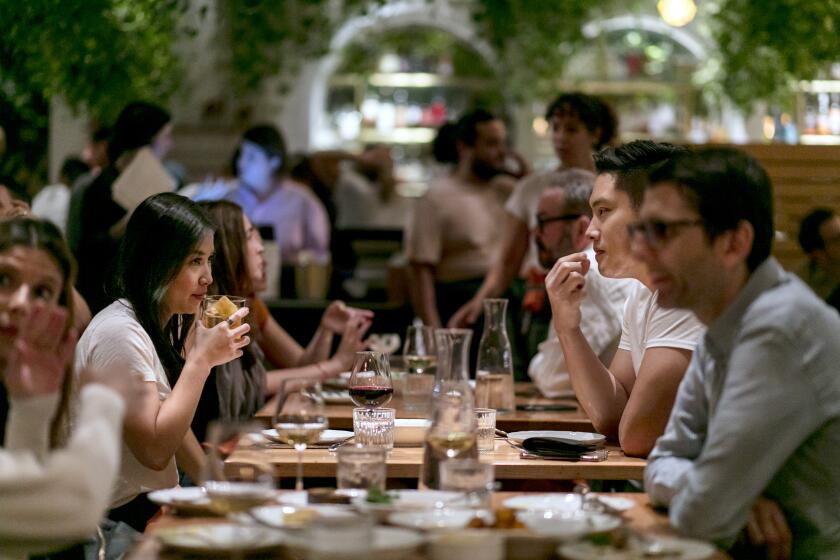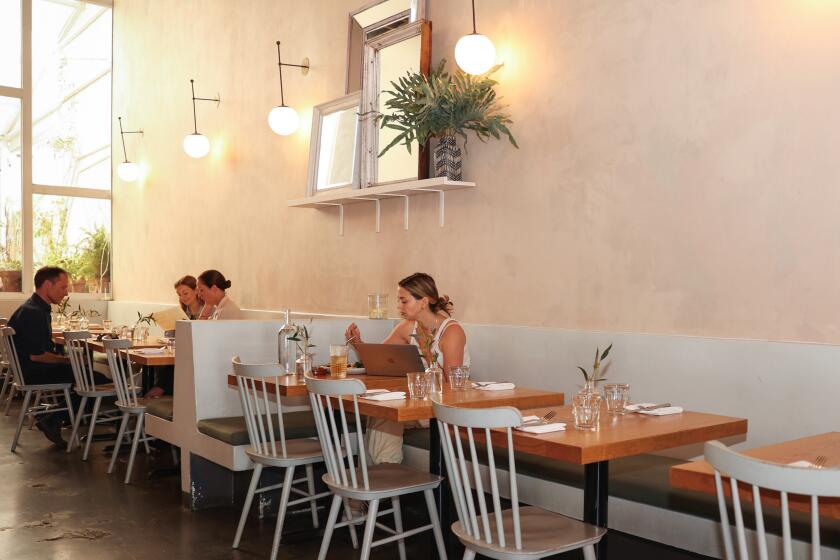In 11th-hour reversal, state Senate passes emergency bill to exempt restaurants from service-fee ban

- Share via
An emergency measure that would allow restaurants, bars and other food sellers to continue to charge service fees unanimously passed the California State Senate on Thursday, days before the practice is scheduled to be outlawed.
California restaurateurs are counting the days to July 1, when a statewide law is set to ban restaurants, bars, hotels, concert venues and other businesses from charging service fees — sending the hospitality industry into a tailspin. But SB 1524, a new state bill, could exempt restaurants,bars and other select food vendors from the law if signed by Gov. Gavin Newsom.
Signed into law last October, Senate Bill 478 prohibits “hidden fees” such as service charges. In restaurants and bars, these fees can appear as additional costs on the menu or final bill, ranging from 1% to 22% or even more. The practice is regularly used to stabilize wages across dining rooms and kitchens — where servers often receive tips but cooks and dishwashers do not — and to help offset the cost of benefits such as healthcare.
But the practice has been called into question, with multiple lawsuits filed against restaurateurs over their distribution and use of service fees.
Sens. Bill Dodd (D-Napa) and Nancy Skinner (D-Berkeley) co-wrote SB 478 in what they called an effort to protect consumers from surprise fees. In early June Dodd proposed Senate Bill 1524, a new emergency measure that would clarify aspects of his original bill and, if passed, exempt restaurants from eliminating surcharges, provided they are listed clearly.
“Any mandatory gratuity, service charge or other fee charged by restaurants must be displayed conspicuously on restaurant menus,” a statement from Dodd’s office said. “For example, if a restaurant adds a 20% security fee to all bills, that 20% charge must be clearly stated up front on the menu. It cannot be a surprise that only shows up when the bill arrives.”
According to Thursday’s state Senate agenda, “food or beverage items sold directly to a customer by a restaurant, bar, food concession, grocery store, or grocery delivery service, or by means of a menu or contract for banquet or catering services” would be exempt from the July 1 ban, provided the surcharges or fees are clearly listed.
A state ‘junk fees’ law might ‘upend’ how restaurants operate. Customers could face sticker shock when fees are rolled into menu prices.
SB 1524, which unanimously passed both the state Assembly and Senate this week, would take effect immediately. It is co-authored by Sen. Scott Wiener (D-San Francisco) and Assemblymembers Matt Haney (D-San Francisco), Jesse Gabriel (D-Encino) and Cecilia Aguiar-Curry (D-Winters).
“This measure has enjoyed unanimous bipartisan support, and recent amendments have responded to concerns from some consumer groups,” Haney said in an address to the Assembly on Tuesday.
A representative for Gov. Newsom told the L.A. Times that the team did not know when the governor would review the bill, but that once it crosses his desk he will have 12 days to consider the bill and determine whether or not to sign it into law.
In February a representative for Atty. Gen. Rob Bonta, who co-sponsored SB 478, told the Los Angeles Times that restaurants and bars would need to roll what were previously listed surcharge percentages into the list prices of menus and confirmed the guidance in “price transparency law” guidelines last month.
Until it is signed, restaurants and bars must adhere to SB 478 come July 1. SB 478 would not impose fines on restaurants but could open them up to lawsuits come July 1. A number of California restaurants and bars have already begun eliminating surcharges entirely or rolling the fees into menu prices, per the attorney general’s guidance. In April restaurateur Dustin Lancaster rolled his 4% service fees into the menu list prices at two of his L.A. businesses — L&E Oyster Bar and El Condor — in advance of the deadline.
Some, who had not yet made changes prior to SB 1524’s introduction, have been waiting until the bill’s fate is determined.
In Los Alamos at Michelin-starred French-Californian restaurant Bell’s, Greg and Daisy Ryan have been monitoring the future of service fees and surcharges since November, when they became aware that SB 478 had been signed into law. Ever since, the husband-and-wife team considered pivoting to new business models but decided to monitor legislative developments and policy guidance until the deadline.
“At some point I was like, “I’m just gonna keep waiting,” Greg Ryan said. “I have the things in my brain that I can implement pretty quickly, and that’s because I’ve spent the last two months trying to come to terms with things.”
Reversing course, the author of a bill to ban junk fees has proposed emergency legislation to carve out an exemption for restaurants.
Bell’s currently charges a 20% service fee, which is listed on the restaurant’s dinner and lunch menus as well as on the website’s section for frequently asked questions. The homepage notes that the service fee also applies to takeout orders. “The entirety of this charge is retained by Bell’s, of which 100% is distributed to all non-management employees in the form of wages and benefits,” the menu statement reads. “We believe this model creates better equity, stability and constancy for all employees across the kitchen and dining room. Any additional gratuity paid on the day of your meal is at the discretion of each guest and is not required.”
Should SB 1524 remain unsigned by July 1, the Ryans will remove surcharges; if the bill is signed into law before then, the service charge will remain, with the owners awaiting final guidance to learn whether their verbiage must change or be posted elsewhere.
The topic of surcharges and service fees, he said, has been all-consuming as a small-business owner.
“When someone’s like, ‘Hey, can you do this right now?’ I’m like, ‘I will talk to you after July 1,’” Ryan said.
Many restaurateurs told the L.A. Times that rolling surcharge fees into menu pricing would cost them customers due to sticker shock at an already fraught time for the industry.
“Restaurants are vital to the fabric of life in California, and they should be able to cover costs as long as they do so transparently,” Wiener, a co-author of the new bill, said in a statement earlier this month. “SB 1524 clarifies portions of the law that pose a serious threat to restaurants. The bill strikes the right balance between supporting restaurants and delivering transparency for consumers, and I’m proud to support it.”
More to Read
Eat your way across L.A.
Get our weekly Tasting Notes newsletter for reviews, news and more.
You may occasionally receive promotional content from the Los Angeles Times.













